医疗英语会话36-40
医护英语会话

医务英语—电话预约Telephone Appointment对话 1:(为自己预约)Dialogue One (make an appointment with the doctor for oneself)值班护士:早上好,这里是约翰逊大夫办公室。
有什么需要帮忙的吗?Clerk: Good morning. This is Doctor Johnson's office. What can I do for you?雷德太太:是的。
我是雷德太太。
我想本周预约看病。
Mrs. Reed: Yes, this is Mrs. Reed. I'd like to make an appointment to see the doctor this week.值班护士:好的。
恐怕约翰逊大夫本周星期一和星期二都已经被预约满了。
Clerk: Well, let's see. I'm afraid he is fully booked on Monday and Tuesday.雷德太太:星期四怎么样?Mrs. Reed: How about Thursday?值班护士:抱歉,星期四也已经预约满了。
雷德太太,星期三你方便吗?Clerk: Sorry, but I have to say he is also occupied on Thursday. So, will Wednesday be O.K. for you, Mrs. Reed?雷德太太:星期三我得上班。
顺便问一下,约翰逊大夫星期六有空吗?Mrs. Reed: I have to work on Wednesday. By the way, is Dr. Johnson available on Saturday?值班护士:我们周末不上班。
Clerk: I'm afraid the office is closed on weekends.雷德太太:那么,星期五如何?Mrs. Reed: well, what about Friday?值班护士:星期五。
常用的医疗会话英语
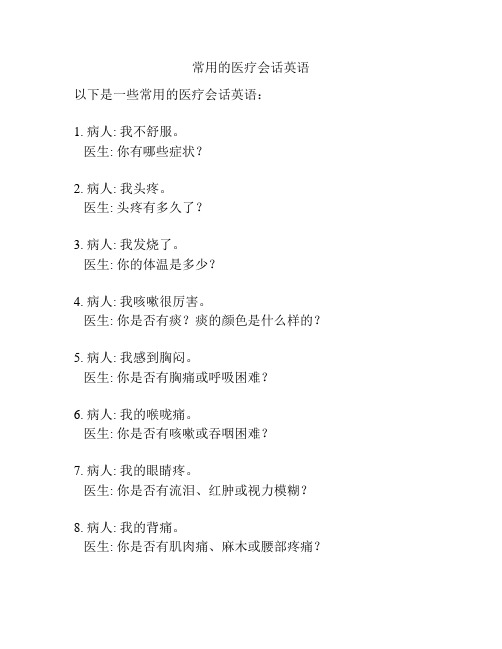
常用的医疗会话英语
以下是一些常用的医疗会话英语:
1. 病人: 我不舒服。
医生: 你有哪些症状?
2. 病人: 我头疼。
医生: 头疼有多久了?
3. 病人: 我发烧了。
医生: 你的体温是多少?
4. 病人: 我咳嗽很厉害。
医生: 你是否有痰?痰的颜色是什么样的?
5. 病人: 我感到胸闷。
医生: 你是否有胸痛或呼吸困难?
6. 病人: 我的喉咙痛。
医生: 你是否有咳嗽或吞咽困难?
7. 病人: 我的眼睛疼。
医生: 你是否有流泪、红肿或视力模糊?
8. 病人: 我的背痛。
医生: 你是否有肌肉痛、麻木或腰部疼痛?
9. 病人: 我感到疲劳。
医生: 你是否有食欲减退或体重下降?
10. 医生: 我会给你开一些药物来缓解症状。
病人: 谢谢,我会按时服用。
11. 医生: 我建议你多休息和喝水。
病人: 好的,我会注意的。
12. 病人: 我需要做进一步的检查吗?
医生: 是的,我建议你做一些血液检查或X光片。
请注意,这些只是一些常见的会话范例。
在医疗情况下,建议您向医生提供更详细的病情描述,以便获得最准确的诊断和治疗建议。
初中英语看病对话范文
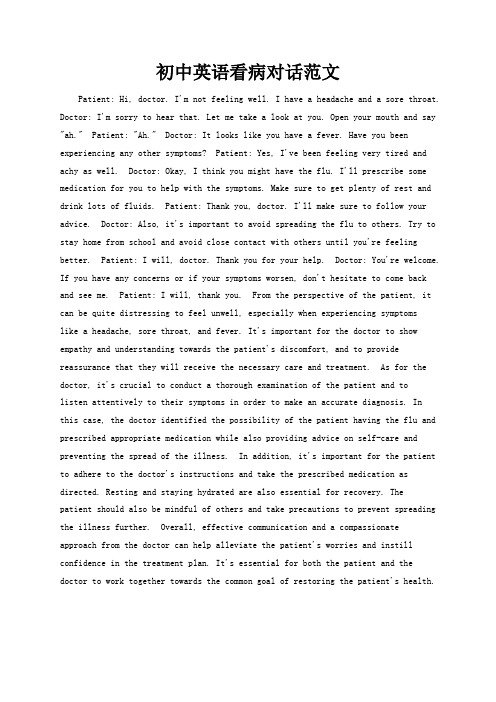
初中英语看病对话范文Patient: Hi, doctor. I'm not feeling well. I have a headache and a sore throat. Doctor: I'm sorry to hear that. Let me take a look at you. Open your mouth and say "ah." Patient: "Ah." Doctor: It looks like you have a fever. Have you been experiencing any other symptoms? Patient: Yes, I've been feeling very tired and achy as well. Doctor: Okay, I think you might have the flu. I'll prescribe some medication for you to help with the symptoms. Make sure to get plenty of rest and drink lots of fluids. Patient: Thank you, doctor. I'll make sure to follow your advice. Doctor: Also, it's important to avoid spreading the flu to others. Try to stay home from school and avoid close contact with others until you're feeling better. Patient: I will, doctor. Thank you for your help. Doctor: You're welcome. If you have any concerns or if your symptoms worsen, don't hesitate to come backand see me. Patient: I will, thank you. From the perspective of the patient, it can be quite distressing to feel unwell, especially when experiencing symptomslike a headache, sore throat, and fever. It's important for the doctor to show empathy and understanding towards the patient's discomfort, and to provide reassurance that they will receive the necessary care and treatment. As for the doctor, it's crucial to conduct a thorough examination of the patient and tolisten attentively to their symptoms in order to make an accurate diagnosis. Inthis case, the doctor identified the possibility of the patient having the flu and prescribed appropriate medication while also providing advice on self-care and preventing the spread of the illness. In addition, it's important for the patient to adhere to the doctor's instructions and take the prescribed medication as directed. Resting and staying hydrated are also essential for recovery. Thepatient should also be mindful of others and take precautions to prevent spreading the illness further. Overall, effective communication and a compassionateapproach from the doctor can help alleviate the patient's worries and instill confidence in the treatment plan. It's essential for both the patient and thedoctor to work together towards the common goal of restoring the patient's health.。
生病就医情景对话范文英语

生病就医情景对话范文英语Doctor: Hello, how can I help you today?Patient: I'm not feeling well. I have a headache, asore throat, and a runny nose.Doctor: When did your symptoms start?Patient: They started yesterday.Doctor: Have you taken any medication for your symptoms? Patient: No, I haven't.Doctor: I'm going to listen to your lungs and checkyour throat.(The doctor listens to the patient's lungs and checks their throat.)。
Doctor: Your lungs sound clear, but your throat is a little red and swollen. I'm going to prescribe you some antibiotics for your sore throat and some pain relievers for your headache.Patient: Thank you.Doctor: You're welcome. I also recommend that you get plenty of rest and drink plenty of fluids.Patient: I will.Doctor: If your symptoms don't improve in a few days, or if they get worse, please come back and see me.Patient: I will. Thank you again.Doctor: You're welcome.Additional Questions the Doctor May Ask:What is the severity of your symptoms?Have you had any other symptoms, such as fever, cough, or nausea?Do you have any underlying health conditions?Are you taking any medications?Do you have any allergies?Have you recently traveled?Have you been in contact with anyone who is sick?Additional Information the Patient May Provide:The duration of their symptoms.The severity of their symptoms.Any other symptoms they are experiencing.Any underlying health conditions they have.Any medications they are taking.Any allergies they have.Any recent travel they have done.Any contact they have had with anyone who is sick.Tips for Communicating with Your Doctor:Be clear and concise when describing your symptoms.Answer the doctor's questions honestly and completely. Ask questions if you don't understand something.Follow the doctor's instructions carefully.If your symptoms don't improve or get worse, don't hesitate to contact your doctor.。
实用医学英语会话

实用医学英语会话医务人员常用语1.What can do for you?你有什么事?2.May I help you?我能帮你什么忙?8.Please take a seat!please sit down!请坐下.4.Wait a moment,please.请等一等.5.Sorry to have kept you waiting.对不起让你久等了.6.It is not serious.病情不严重.7.Don't worry.There is nothing to worry about.不必顾虑。
8.You need a thorough examination.你需要做一个全面检查.9.You will have to stay in hospital for sevral days.你需要在医院里住几夭.We think that you had better be hospitalized我们认为你最好住进医院来。
10.You should stay in bed for a few days.你需要卧床几天.11.You can keep on working.You can carry on with your work.可以继续工作。
12.You should be very careful for a week or two这一两周内,你需要很注意。
13. Try to relax and keep calm.尽量放松保持镇静。
14.You'll soon be all right.你很快就会好起来的.15.1'm sure this medicine will help you a great deal.这药对你肯定会很有效的.16.Feeling well again is a rather slow process,I'm afraid.恐怕痊愈将是一个很慢的过程.17.You will have to wait for twenty minutes.你需要等20分钟.18.Complete recovery will take a rather long time.彻底恢复需要一段很长的时间。
医疗情景会话,英文
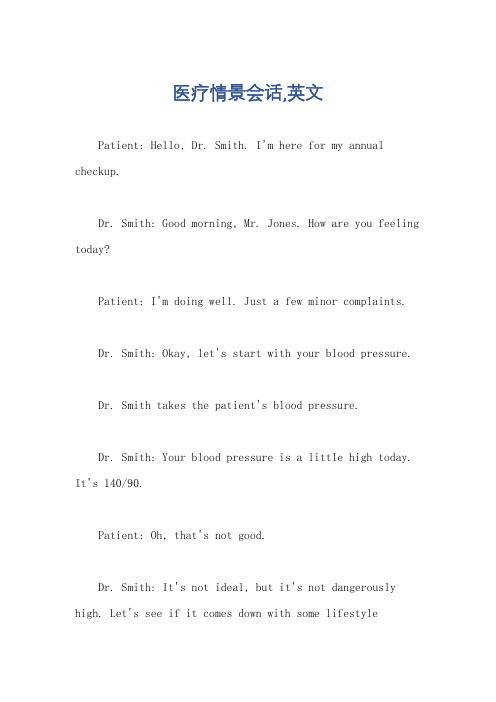
医疗情景会话,英文Patient: Hello, Dr. Smith. I'm here for my annual checkup.Dr. Smith: Good morning, Mr. Jones. How are you feeling today?Patient: I'm doing well. Just a few minor complaints.Dr. Smith: Okay, let's start with your blood pressure.Dr. Smith takes the patient's blood pressure.Dr. Smith: Your blood pressure is a little high today. It's 140/90.Patient: Oh, that's not good.Dr. Smith: It's not ideal, but it's not dangerously high. Let's see if it comes down with some lifestylechanges. I'm going to prescribe you a low-dose blood pressure medication.Patient: Okay.Dr. Smith: I also want to check your cholesterol levels.Dr. Smith draws blood from the patient's arm.Dr. Smith: Your cholesterol levels are also a little high. Your total cholesterol is 220.Patient: That's not good either.Dr. Smith: It's not ideal, but it's not dangerously high. Let's see if it comes down with some lifestyle changes. I'm going to prescribe you a statin medication.Patient: Okay.Dr. Smith: I also want to talk to you about your weight. You're currently overweight.Patient: I know. I've been trying to lose weight, butit's hard.Dr. Smith: I understand. Losing weight can be difficult. But it's important to do so for your health. Being overweight can increase your risk of heart disease, stroke, and other health problems.Patient: I know.Dr. Smith: I'm going to give you some tips on how to lose weight. And I'm going to refer you to a registered dietitian who can help you create a personalized weightloss plan.Patient: Thank you.Dr. Smith: You're welcome. I also want to check your prostate.Dr. Smith performs a digital rectal exam.Dr. Smith: Your prostate is slightly enlarged, but it's not cancerous.Patient: That's a relief.Dr. Smith: I'm going to prescribe you a medication to shrink your prostate.Patient: Okay.Dr. Smith: I also want to talk to you about your smoking.Patient: I know. I need to quit.Dr. Smith: Quitting smoking is one of the best things you can do for your health. It will reduce your risk of heart disease, stroke, and other health problems.Patient: I know.Dr. Smith: I'm going to give you some tips on how to quit smoking. And I'm going to refer you to a smoking cessation counselor who can help you.Patient: Thank you.Dr. Smith: You're welcome. Well, that's all for today. I'll see you back in six months for your next checkup.Patient: Thank you, Dr. Smith.Dr. Smith: You're welcome.。
医护英语对话doc

医护英语会话:西药-医护英语病人:早上好,大夫。
Patient: Good morning, doctor.药剂师:早上好,女士。
请问有什么需要我帮忙的吗?Chemist: Good morning, madam. What can I do for you?病人:请按药方帮我抓药好吗?Patient: Can you fill the prescription for me?药剂师:当然可以。
请把你的药方给我看一下。
Chemist: Of course. Please show me the Prescription.病人:给你。
Patient: Here you are.药剂师:请稍等片刻。
好了。
因要的药全在这儿了。
Chemist: Just a moment, please. All right. Your prescrition is ready.病人:谢谢。
Patient: Thank you very much.药剂师:别客气。
我顺便问一下,你的这个药方是约翰逊大夫给你开的吧。
Chemist: Don't mention it. By the way, you got the prescription from Dr. Johson, didn't you?病人:是的。
Patient: Yes, indeed.药剂师:那么他有没有告诉你怎么服用这些要呢?Chemist: Did he tell you how to take the medicine?病人:没有,他没有说怎么服用。
Patient: No. he didn't say anything about it.药剂师:好的。
让我给你解释解释吧。
这些药片每日三次,每次两片。
记住在饭后服用。
Chemist: All right. Let me tell you what you have to do. Take two of these tablets three times a day after meals.病人:那么这个止咳糖浆怎么服用呢?Patient: How about this cough syrup?药剂师:先把药瓶摇晃几下。
医疗英语口语 日常英语口语100句
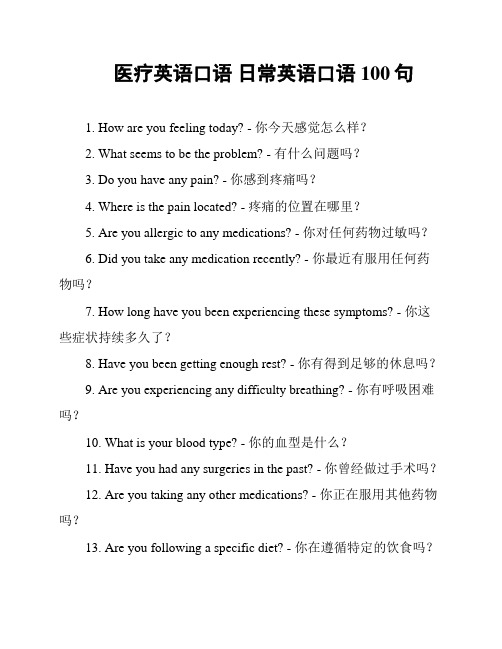
医疗英语口语日常英语口语100句1. How are you feeling today? - 你今天感觉怎么样?2. What seems to be the problem? - 有什么问题吗?3. Do you have any pain? - 你感到疼痛吗?4. Where is the pain located? - 疼痛的位置在哪里?5. Are you allergic to any medications? - 你对任何药物过敏吗?6. Did you take any medication recently? - 你最近有服用任何药物吗?7. How long have you been experiencing these symptoms? - 你这些症状持续多久了?8. Have you been getting enough rest? - 你有得到足够的休息吗?9. Are you experiencing any difficulty breathing? - 你有呼吸困难吗?10. What is your blood type? - 你的血型是什么?11. Have you had any surgeries in the past? - 你曾经做过手术吗?12. Are you taking any other medications? - 你正在服用其他药物吗?13. Are you following a specific diet? - 你在遵循特定的饮食吗?14. Have you been feeling dizzy or lightheaded? - 你感到头晕或头昏吗?15. Can you describe your symptoms in detail? - 你能详细描述你的症状吗?16. Do you have a family history of any medical conditions? - 你的家族中有任何医学状况吗?17. Are you sexually active? - 你有性生活吗?18. Have you been tested for any sexually transmitted infections? - 你曾经接受过任何性传播感染的测试吗?19. When was your last menstrual period? - 你上次月经是什么时候?20. How often do you exercise? - 你多久锻炼一次?21. Are you experiencing any changes in your appetite? - 你的食欲有任何变化吗?22. Are you experiencing any changes in your weight? - 你的体重有任何变化吗?23. Are you experiencing any changes in your sleep patterns? - 你的睡眠模式有任何变化吗?24. Are you experiencing any changes in your vision? - 你的视力有任何变化吗?25. Have you been feeling depressed or anxious? - 你感到抑郁或焦虑吗?26. Do you smoke or drink alcohol? - 你抽烟或喝酒吗?27. Are you currently taking any supplements or herbal remedies? - 你目前正在服用任何补品或草药吗?28. How often do you consume caffeine? - 你多久摄入一次咖啡因?29. Have you been experiencing any urinary problems? - 你有任何尿液方面的问题吗?30. Are you experiencing any changes in your bowel movements? - 你的排便有任何变化吗?31. Are you sexually active and not using contraception? - 你正在有性生活并且不使用避孕措施吗?32. Do you have any history of sexually transmitted infections? - 你有任何性传播感染的病史吗?33. Have you recently traveled to any foreign countries? - 最近你有去过其他国家吗?34. Have you been in contact with anyone who has been sick? - 你与任何生病的人接触过吗?35. Do you live or work in an environment with potential health hazards? - 你生活或工作的环境可能有健康隐患吗?36. Have you been exposed to any chemicals or toxins? - 你接触到任何化学物质或毒素吗?37. Do you have any known allergies? - 你有任何已知的过敏吗?38. Have you had any recent X-rays or other medical imaging? - 你最近有过X光或其他医学影像吗?39. Are you experiencing any chest pains or tightness? - 你有胸痛或紧迫感吗?40. Are you experiencing any difficulty swallowing? - 你有吞咽困难吗?41. Have you had any recent injuries or accidents? - 你最近有过任何伤害或事故吗?42. Have you experienced any loss of consciousness or seizures? - 你有过任何失去意识或痉挛的经历吗?43. Are you experiencing any changes in your hearing? - 你的听力有任何变化吗?44. Are you experiencing any changes in your sense of taste or smell? - 你的味觉或嗅觉有任何变化吗?45. Have you had any recent blood tests? - 你最近有过任何血液测试吗?46. Are you currently pregnant or trying to conceive? - 你目前怀孕或试图怀孕吗?47. Are you experiencing any changes in your menstrual cycle? - 你的月经周期有任何变化吗?48. When was your last pap smear or gynecological examination? - 你最近进行了宫颈抹片或妇科检查吗?49. Do you have any concerns about your sexual health? - 你对你的性健康有任何担忧吗?50. Are you experiencing any changes in your mood or emotions? - 你的情绪或情感有任何变化吗?51. Do you have a history of mental health disorders? - 你有心理健康障碍的病史吗?52. Have you been experiencing any memory problems? - 你有任何记忆问题吗?53. Are you experiencing any changes in your coordination or balance? - 你的协调或平衡有任何变化吗?54. Have you had any recent falls or accidents? - 你最近有过任何跌倒或事故吗?55. Are you experiencing any numbness or tingling sensations? - 你有任何麻木或刺痛感吗?56. Do you have any family history of neurological disorders? - 你有任何神经系统疾病的家族史吗?57. Are you experiencing any difficulty with speaking or understanding language? - 你有语言表达或理解上的困难吗?58. Have you had any recent head injuries? - 你最近有过任何头部受伤吗?59. Do you have any dental concerns? - 你有任何牙齿方面的顾虑吗?60. Are you experiencing any changes in your oral health? - 你的口腔健康有任何变化吗?61. Have you had any recent dental procedures? - 你最近做过任何牙科手术吗?62. How often do you brush and floss your teeth? - 你多久刷牙和用牙线?63. Do you wear any dental appliances like braces or dentures? - 你戴着任何牙科器械,如牙套或假牙吗?64. Have you been experiencing any skin problems? - 你有任何皮肤问题吗?65. Are you experiencing any changes in your skin, such as rashesor discoloration? - 你的皮肤有任何变化,如皮疹或色素沉着吗?66. Have you had any recent skin biopsies or dermatological procedures? - 你最近有进行过任何皮肤活检或皮肤科手术吗?67. Are you currently using any skincare products or medicationsfor your skin? - 你目前使用任何护肤品或药物来护理你的皮肤吗?68. Have you had any recent eye exams? - 你最近有进行过任何眼科检查吗?69. Are you experiencing any changes in your vision, such as blurriness or double vision? - 你的视力有任何变化,如模糊或重影吗?70. Do you wear corrective lenses or contact lenses? - 你戴矫正眼镜或隐形眼镜吗?71. Have you had any recent eye surgeries or procedures? - 你最近有进行过任何眼科手术或程序吗?72. Are you currently using any eye drops or medications for your eyes? - 你目前使用任何眼药水或眼科药物吗?73. Do you have any family history of eye conditions or diseases? - 你有任何眼科疾病的家族史吗?74. Are you experiencing any changes in your hearing? - 你的听力有任何变化吗?75. Have you had any recent hearing tests or audiograms? - 你最近有进行过任何听力测试或听力图表测定吗?76. Do you wear any hearing aids? - 你戴助听器吗?77. Are you currently using any ear drops or medications for your ears? - 你目前使用任何滴耳液或耳科药物吗?78. Have you had any recent ear surgeries or procedures? - 你最近有进行过任何耳科手术或程序吗?79. Are you experiencing any changes in your balance or dizziness? - 你的平衡或头晕有任何变化吗?80. Have you had any recent audiology evaluations or vestibular tests? - 你最近有进行过任何听力学评估或前庭测试吗?81. Do you wear any orthopedic devices or braces? - 你戴任何矫形设备或支架吗?82. Have you had any recent fractures or injuries to your bones or joints? - 你最近有过任何骨折或关节损伤吗?83. Are you experiencing any difficulty with movement or joint pain? - 你的运动或关节有任何困难或疼痛吗?84. Have you had any recent physical therapy sessions? - 你最近有进行过任何物理治疗吗?85. Are you currently taking any medications for pain or inflammation? - 你目前服用任何止痛或消炎药物吗?86. Do you have any family history of orthopedic conditions or diseases? - 你有任何骨科疾病的家族史吗?87. Are you experiencing any changes in your gastrointestinal system? - 你的消化系统有任何变化吗?88. Have you had any recent abdominal surgeries or procedures? - 你最近进行过任何腹部手术或程序吗?89. Are you experiencing any changes in your bowel habits or bowel movements? - 你的排便惯或排便有任何变化吗?90. Are you currently taking any medications for gastrointestinal issues? - 你目前正在服用任何消化系统问题的药物吗?91. Have you had any recent endoscopies or colonoscopies? - 你最近进行过任何内窥镜检查或结肠镜检查吗?92. Do you have any family history of gastrointestinal conditions or diseases? - 你有任何消化系统疾病的家族史吗?93. Are you experiencing any changes in your urinary system? - 你的泌尿系统有任何变化吗?94. Have you had any recent urinary tract infections or kidney stones? - 你最近有进行过任何尿路感染或肾结石的治疗吗?95. Are you experiencing any changes in your urinary frequency or urgency? - 你的排尿频率或紧迫感有任何变化吗?96. Are you currently taking any medications for urinary issues? - 你目前正在服用任何泌尿系统问题的药物吗?97. Have you had any recent kidney function tests or bladder scans? - 你最近有进行过任何肾功能测试或膀胱扫描吗?98. Do you have any family history of urinary conditions or diseases? - 你有任何泌尿系统疾病的家族史吗?99. Are you experiencing any changes in your reproductive system? - 你的生殖系统有任何变化吗?100. Have you had any recent screenings or exams for reproductive health? - 你最近有进行过任何生殖健康方面的筛查或检查吗?以上是一些日常医疗英语口语的例句,希望对您有帮助!。
医院英语口语会话内科医生护士英语会话
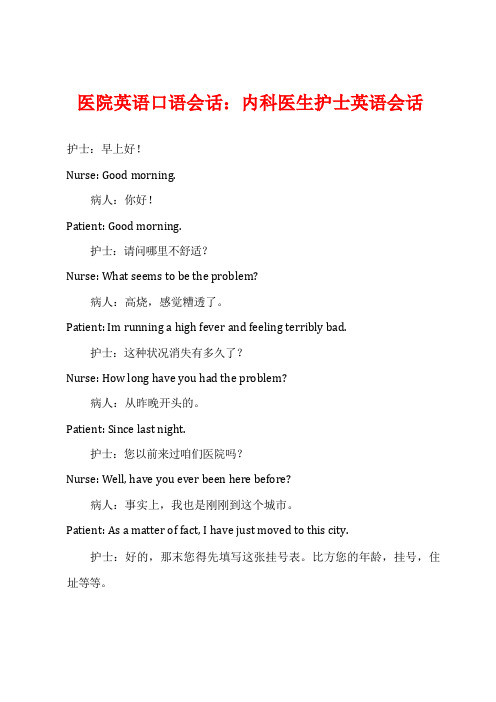
护士:早上好!Nurse: Good morning.病人:你好!Patient: Good morning.护士:请问哪里不舒适?Nurse: What seems to be the problem?病人:高烧,感觉糟透了。
Patient: Im running a high fever and feeling terribly bad.护士:这种状况消失有多久了?Nurse: How long have you had the problem?病人:从昨晚开头的。
Patient: Since last night.护士:您以前来过咱们医院吗?Nurse: Well, have you ever been here before?病人:事实上,我也是刚刚到这个城市。
Patient: As a matter of fact, I have just moved to this city.护士:好的,那末您得先填写这张挂号表。
比方您的年龄,挂号,住址等等。
Nurse: O. K. In that case, you have to fill in this registration card. Your age, gender, address and things like that.病人:每问题。
请问我应当挂哪科?Patient: No problem. Which department should I register with, madam? 护士:您挂内科。
Nurse: You”d better go to the medical department.病人:表填好,给你。
Patient: Here is my registration card.护士:感谢。
挂号费是一美圆。
Nurse: Thank you. The registration fee is one dollar.,病人:好的。
英汉对照医务英语会话
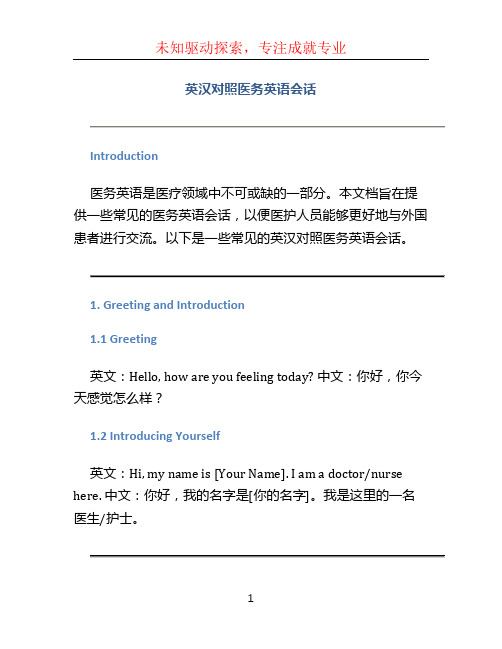
英汉对照医务英语会话Introduction医务英语是医疗领域中不可或缺的一部分。
本文档旨在提供一些常见的医务英语会话,以便医护人员能够更好地与外国患者进行交流。
以下是一些常见的英汉对照医务英语会话。
1. Greeting and Introduction1.1 Greeting英文:Hello, how are you feeling today? 中文:你好,你今天感觉怎么样?1.2 Introducing Yourself英文:Hi, my name is [Your Name]. I am a doctor/nurse here. 中文:你好,我的名字是[你的名字]。
我是这里的一名医生/护士。
2. Patient Information2.1 Asking for Personal Information英文:Can you please tell me your name and date of birth? 中文:请告诉我你的姓名和出生日期,好吗?2.2 Asking about Allergies英文:Do you have any allergies? 中文:你有过敏吗?2.3 Asking about Medical History英文:Do you have any medical conditions or past surgeries that I should be aware of? 中文:你有任何疾病或过去的手术吗?我应该知道吗?3. Symptoms and Complaints3.1 Asking about Symptoms英文:What symptoms are you experiencing? 中文:你有什么症状?3.2 Describing Pain英文:On a scale of 1 to 10, how would you rate your pain? 中文:根据1到10的标准,你的疼痛程度是多少?3.3 Asking about Location of Pain英文:Where is the pain located? 中文:你哪里疼?4. Diagnosis and Treatment4.1 Giving a Diagnosis英文:Based on your symptoms, I believe you have [diagnosis]. 中文:根据你的症状,我认为你患有[诊断结果]。
医务英语会话
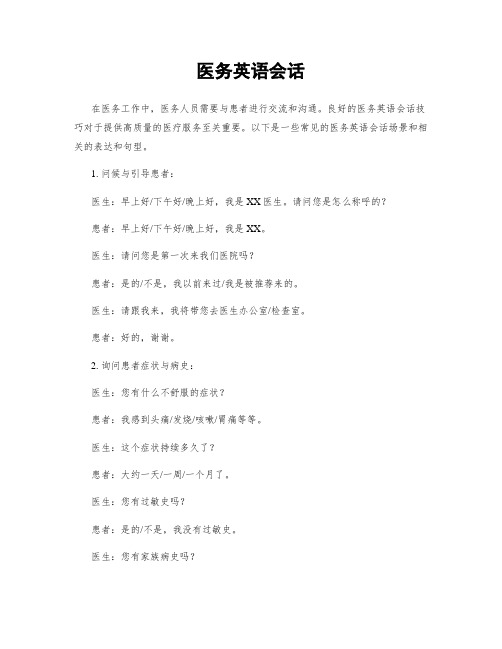
医务英语会话在医务工作中,医务人员需要与患者进行交流和沟通。
良好的医务英语会话技巧对于提供高质量的医疗服务至关重要。
以下是一些常见的医务英语会话场景和相关的表达和句型。
1. 问候与引导患者:医生:早上好/下午好/晚上好,我是XX医生。
请问您是怎么称呼的?患者:早上好/下午好/晚上好,我是XX。
医生:请问您是第一次来我们医院吗?患者:是的/不是,我以前来过/我是被推荐来的。
医生:请跟我来,我将带您去医生办公室/检查室。
患者:好的,谢谢。
2. 询问患者症状与病史:医生:您有什么不舒服的症状?患者:我感到头痛/发烧/咳嗽/胃痛等等。
医生:这个症状持续多久了?患者:大约一天/一周/一个月了。
医生:您有过敏史吗?患者:是的/不是,我没有过敏史。
医生:您有家族病史吗?患者:是的/不是,我没有家族病史。
3. 给予患者建议与指导:医生:您应该多休息/喝水/吃健康的食物。
患者:好的,我会注意的。
医生:您需要进行进一步的检查/化验。
患者:好的,我会按照医生的建议去做的。
医生:您需要服用这个药物。
患者:好的,我会按照医生的处方用药。
4. 解释医疗诊断与治疗方案:医生:经过检查,您的检查结果显示有XX问题。
患者:我明白了。
医生:我们建议您进行手术/放疗/化疗等治疗方式。
患者:我需要考虑一下。
医生:治疗过程可能会有一些不适,请您了解。
患者:我会注意的。
5. 给予患者鼓励与慰问:医生:您的病情有好转的迹象。
患者:太好了,我感到很欣慰。
医生:您需要坚持治疗,保持乐观的心态。
患者:谢谢医生的鼓励,我会努力的。
医生:如果您有任何问题,请随时向我咨询。
患者:好的,谢谢医生。
以上是一些常见的医务英语会话场景和相关的表达和句型。
医务英语会话对于医务工作者来说是一项重要的技能,通过良好的交流,医生和患者可以更好地沟通,从而提供更好的医疗服务。
医生在会话中要注意用简单的语言解释医疗术语,以确保患者能够理解。
同时,医生应该保持耐心和同理心,给予患者安慰和鼓励,帮助他们度过难关。
英语看病的小对话10句
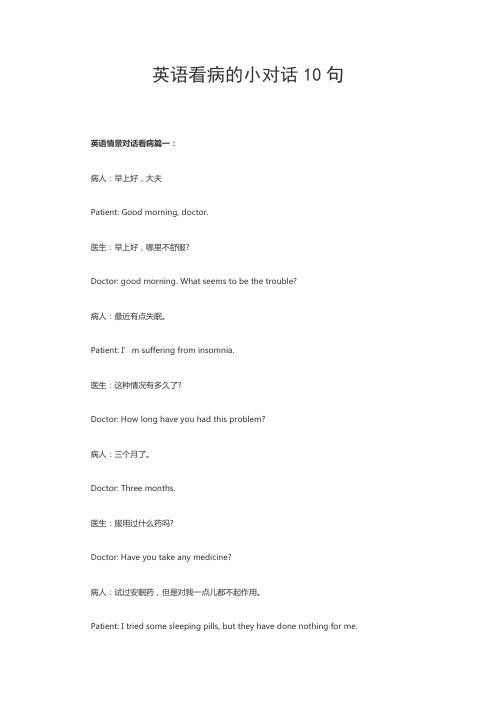
英语看病的小对话10句英语情景对话看病篇一:病人:早上好,大夫Patient: Good morning, doctor.医生:早上好,哪里不舒服?Doctor: good morning. What seems to be the trouble?病人:最近有点失眠。
Patient: I’m suffering from insomnia.医生:这种情况有多久了?Doctor: How long have you had this problem?病人:三个月了。
Doctor: Three months.医生:服用过什么药吗?Doctor: Have you take any medicine?病人:试过安眠药,但是对我一点儿都不起作用。
Patient: I tried some sleeping pills, but they have done nothing for me.医生:有头痛的情况吗?Doctor: Do you have headaches?病人:有时候有。
吃饭也没有胃口,总是感紧不安。
Patient: Sometimes. I have no appetite and always on the edge.医生:让我量量你的血压。
你看来贫血。
Doctor: Let me take your blood pressure. You look anemic. (Taking the patient’s blood pressure.)医生:嗯,没什么好担心的。
你只不过是有点劳累过度。
Doctor: Well, there is nothing to be alarmed about. You are just a little exhausted from overwork.病人:我该怎么呢?Patient: What should I do then?医生:我想你应该多休息休息。
医务人员常用语、常用对话、常见疾病对话

医务人员常用英语对话A一、询问病情:1. 问现病史:Hello, may (can) I help you? 您好,我可以帮您吗?What seems to be bothering you?您觉得哪儿不舒服?How are you feeling now?你现在觉得怎么样?Have you got a headache / a cough?你头痛/咳嗽吗?Are you bring anything up when you cough?咳嗽时有痰吗?How do you feel with your stomach?你感觉胃不舒服吗?Where is your pain?你觉得哪儿痛?What kind of pain do you feel?你觉得怎么个痛法?Has it happened before? 这种情况以前发生过吗?Is the pain getting less?疼痛减轻些了吗?Did you receive any treatment before you came to the hospital?来医院前你接受过治疗吗?Have you taken any medicine? 你吃过什么药吗?2。
问病程:When did you feel unwell?你什么时候觉得不舒服的?When did the pain start?疼痛何时开始的?How long have you had the problem?你像这样多久了?3。
问一般情况:Did you take your temperature? 你量过体温吗?Did you sleep well? 你睡得好吗?Do you feel tired? 你觉得疲劳吗?How’s your appetite? 你的胃口怎么样?4. 问既往史:Have you ever had any surgery / low grade fever / any chronic ailments / cold sweats at night / attacks of asthma?你有动过手术(发低烧、任何慢性病、间出冷汗、哮喘发作)吗?Have you ever had any Infectious diseases like tuberculosis or typhoid?你得过类似结核或伤寒的传染病吗?Are you allergic to any medications?你对药物过敏吗? 5。
医生患者英语对话精选

医生患者英语对话精选情景对话因为有生动的生活场景和话题,极大地激发了学生练习英语口语的兴趣,为学生提供了练习口语表达的机会。
店铺整理了医生患者英语对话, 欢迎阅读!医生和患者英语对话一A:Hello, Miss.Sit down, please.你好, 小姐。
请坐。
B:Hi, I am feeling terrible.你好, 我感觉糟糕透了。
A:Oh, what's wrong with you?哦, 你怎么了?B:My whole body feels weak, and I have a sore throat.我觉得浑身无力, 而且我喉咙痛。
A:Put this thermometer under your tongue first.What cause the illness?首先把这个温度计放在舌下。
怎么生病了?B:I didn't close the window before going to bed last night.我昨晚睡觉前没关窗户。
A:You do have a fever.I want to take a look at your throat.Open your mouth, please say ah你确实是发烧了。
我想看看你的喉咙。
张嘴说“啊”。
B:Ah.Is it serious?啊。
严重吗?A;Hmm, I think it's nothing serious.Don't worry about it.嗯, 我想没什么严重的。
不用担心。
B:But what should I do to get well?但是我要怎样做才能康复?A:I'll give you an injection first, then I will give you some medicine.我先给你打一针, 然后给你开一些药。
B:When do I take the medicine?我什么时候吃这些药呢?A:Take them after meals twice a day.这些药一天服两次, 饭后服用。
医疗英语对话
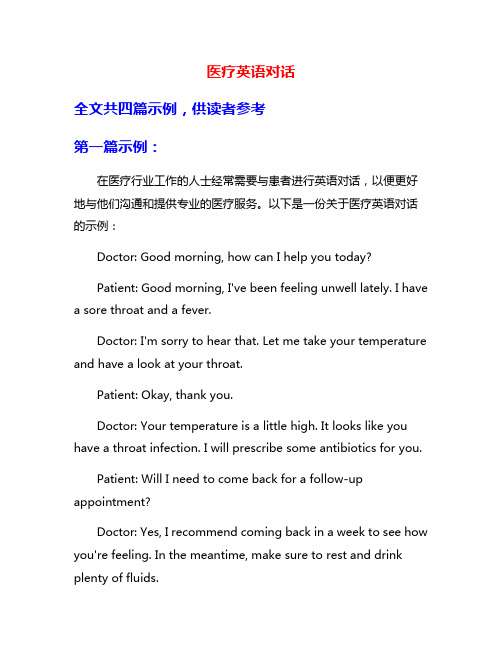
医疗英语对话全文共四篇示例,供读者参考第一篇示例:在医疗行业工作的人士经常需要与患者进行英语对话,以便更好地与他们沟通和提供专业的医疗服务。
以下是一份关于医疗英语对话的示例:Doctor: Good morning, how can I help you today?Patient: Good morning, I've been feeling unwell lately. I have a sore throat and a fever.Doctor: I'm sorry to hear that. Let me take your temperature and have a look at your throat.Patient: Okay, thank you.Doctor: Your temperature is a little high. It looks like you have a throat infection. I will prescribe some antibiotics for you.Patient: Will I need to come back for a follow-up appointment?Doctor: Yes, I recommend coming back in a week to see how you're feeling. In the meantime, make sure to rest and drink plenty of fluids.Patient: Thank you, doctor. I will follow your advice.Doctor: You're welcome. If you have any other concerns, feel free to call the clinic.第二篇示例:医疗英语对话在医疗场所,医生和患者之间的对话至关重要。
医生护士英语会话

医生护士英语会话:交通事故大夫:你哪里不舒服?Doctor: What seems to be the problem?病人:唉,我刚才过马路,正赶上一辆车从拐角处开过来。
由于车速过快,等司机看到我再刹车时,已经太晚了。
我被撞倒在地,从地上爬起来时,我发现我的左臂和肘部也被擦伤,并且现在我的肋骨有点痛。
Patient: Well, I was crossing the road, where a car came round the corner too quickly, and when the driver saw me, it was too late to stop. I was knocked to the ground, and when I got up,my left arm and elbow were grazed and now, I have a pain in my ribs.大夫:让我检查一下吧。
你哪儿疼啊?Doctor: I'll just take a look. Where does it hurt?病人:这很难说清楚,好象浑身都痛。
Patient: It's hard to say. It hurts all over.大夫:我按这儿,你疼不疼?Doctor: Does it hurt when I do this?病人:哎呀!你一按这儿我就疼得要命。
Patient: Ouch! The pain is very bad when you press here.大夫:你的胳膊和肘部好象没什么问题。
但是出于安全考虑,你还是最好去照一张X光片。
片子照好之后,马上拿过来让我看看。
Doctor: You arm and elbow seem to be all right. But, to be on the safe side, you'd better go to the X-ray Department. When the X-rays are ready, bring them back to me to examine.病人:好的,那么待会儿再见吧!Patient: OK. See you later.大夫:待会儿见!Doctor: See you then!( Ten minutes later, the patient brings back the X-ray plates)病人:这是我的X光片。
医院常用英语会话

医院常用英语会话What is your name? My name is Wang Ming.Where do you live? I live in Hong Kang.How old are you? I am 40 years old.What is your occupation? I am a worker.What trouble do you have? I have a cough and a sore throat.How long have you been sick? I have been sick since yesterday.Did you fall sick abruptly or gradually? I fell sick gradually.What diseases have you had before? I had T.B.at the age of thirty-three. Here, put this thermometer under your tongue.Let me feel your pulse…a little fast.Give me the thermometer. Do I have a fever?Just a little.Unbutton your shirt and let me listen to your chest.Breathe deeply.Open your mouth and say “Ah”.Lie down on the bed, please.Lie on your back.Loosen your waistband.Bend both legs.Relax your muscles.Does it hurt when I press here? It hurts greatly.Point to the painful place.Well, up please. May I go now?No .You have to have a blood test and a chest X-ray. When shall I come back?Come back tomorrow to see the X-ray film. Thank you, doctor. See you tomorrow. The next dayAccording to the symptoms and findings inexaminations, your disease may be diagnosed as T.B.Are your parents in good health? No, my father died of T.B.20 years ago.And how is your mother? She has been sick for a long time.Dose your mother have the same disease as your? Yes, she dose. Doctor, can this disease be cured?We’re determined to try our best to cure you.Here is your prescription.You may go over there for the medicine. Is there anything I should or shouldn’t do?You should rest properly.You had better take a walk in the open air every day.Smoking should be avoided. Thank you very much for your advice. Not at all. It’s my responsibility.二、医护常用会话What class of case is the patient? (这位病人是哪科的?)She is a gynecological patient and she should go to the gynecological ward on the first floor.Whose service will this patient enter? (这病人该归哪位医生治疗?)He will go to Doctor Wang’s service in the Department of Inte rnal Medicine.(该归内科王医生)Send the patient to the hospital by ambulance.Bring this patient to the emergency room for first aid quickly.The patient has copious hemorrhage. Please get the blood-transfusion equipment ready immediately. I’ll give her a blood t ransfusion at once.All right. I’ll bring it to you now. Is there anything else you want?Telephone to the blood bank to ask whether there is preserved blood available for this patient.I’ve just telephoned to ask them, but they say there is no blood avail able for this patient. What shall we do now?Please tell the patient’s relatives to come to the hospital and donate blood to her.I’ll talk over with them at once.Let’s go to make the morning ward-round. (查房)The beds in this ward look untidy. Please charge the bedding today.Let us make up (铺好)Bed 2 now.The patient is in danger and it’s necessary to take his pulse, respiration and blood pressure.All right. I’ll take them every hour.If the patient’s cond ition becomes worse, send for me immediately, please.I’ll surely do so.There is oozing of blood (渗血) form the patient’s wound and the dressing is soiled. Please change it for her today.The patient in Bed 1 suffered with a severe pain last night. His left buttock is inflamed. (发炎) It is swollen, red, hot and painful. An abscess has formed. We have to incise it. Well, I’ll get the instruments and dressing ready for you.The patient has been in a state of shock. Please the patient in the head-low position. Elevate the foot of the bed. Put hot water bottles around him. Give him some fluid by intravenous drip.I think his right femur is broken. Send him to the X-ray department to make sure if there is a fracture.Doctor, the condition of that patient is very poor. What are the orders for her?Give her 100ml.of 50%glucose solution by intravenous injection at once.Doctor Li, that new patient is so excited. I can’t quiet her.Here is an ampoule of Sodium Luminal. Give it intramuscularly(肌注)at once. It will quiet her.When did that patient die?He died at midnight.When will this patient go home?He’ll go home tomorrow or the day after tomorrow.Have those instruments been used?Yes, they’ve been used, but I have cleaned and sterilized th em.Is this medicine to be taken by mouth?The medicine in this bottle is poisonous. Don’t drink it. It’s only for external use.The new patient has a high fever.Examine her blood for malaria parasites. (疟原虫)What shall I do with the patient who has taken poison?Give him a gastric lavage immediately and then give him the antidote.The patient’s bowels haven’t moved (未排大便)for three days.I’ll give him a cathartic now.I am going to operate on the patient in Bed 6 tomorrow. Please shave his abdominal area and clean the skin with soap and water.The patient’s condition is very critical and he has been in a state of coma.I’ll let his relatives know by telephone.The patient’s life is in danger, but we’ll do everything possible to save him.Head nurse, please get the emergency drugs ready before you go off duty.All right. I’ll do so.医院常用英语:服药病人:早上好,大夫。
- 1、下载文档前请自行甄别文档内容的完整性,平台不提供额外的编辑、内容补充、找答案等附加服务。
- 2、"仅部分预览"的文档,不可在线预览部分如存在完整性等问题,可反馈申请退款(可完整预览的文档不适用该条件!)。
- 3、如文档侵犯您的权益,请联系客服反馈,我们会尽快为您处理(人工客服工作时间:9:00-18:30)。
《医生诊疗英语会话》每日一听第036期2 BABY'S CONDITION AT BIRTHBaby’s condition at birthHow was the baby at birth? Did he have any problem? How was he in the first few days of life? Did the baby stay with you or did he need to go to special care or to the nursery for any reason?Yes, he was taken to special care unit because he was very small and he was getting cold and needed to be given oxygen.Was the baby premature-- preterm, appropriate for dates.overdue?He was three weeks early.What did he weigh?Only five pounds.Was the jaundiced?__Yellow when he was born?Yes, he had photo therapy for jaundice.Do you know, Mrs. Smith, whether James had to have any assistance with his breathing? Was he on the ventilator, for example, or was he just on oxygen in his incubator?He had to be ventilated .Did he had have any transfusions ?Yes, he also had an exchange transfusion.Did he had any other problem that you are aware of, such as infections or any need for resuscitation while he was in the special care unit?No, I don’t think so, Doctor, but they are recorded in his special care baby notes.《医生诊疗英语会话》每日一听第037期3 NEWBORN COUNSELLING[生词摘录]spatula n.(涂油漆, 涂药等)抹刀, 压舌板Nystatin n.[微]制霉菌素,制真菌素(一种抗霉菌药)thrush n.画眉, [医]鹅口疮, [兽医](马的)蹄叉腐疽鹅口疮swabs n.拖把, 药签vt.拭抹, 擦洗nappy/ diaper/ n.尿布cot death 婴儿猝死综合症duvet n.<法>用羽毛, 绒毛等制成的棉被umbilical cord n.脐带[原文]Newborn counsellingWhat I’d like to do know, Mrs. Smith, is just have a look at James and check thing out, like his heart and chest. What I’m doing now is I’m just having a look at reflexes to make sure that they are in place I would expect them to be, now I am going to have/take/ a gentle look in his mouth/gently/ with this wooden spatula, now looking in his mouth I can see that he has a little bit of thrush so I’ll give you something called Nystatin for that, to help it goaway. Could you tell me, Mrs Smith, whether you have any concerns about James?Well yes, doctor, I’m little bit concerned about his cord because I would have expected to have come off by now.Will, in fact, Mrs. Smith, this can take a week to ten days but if there were any signs that the separation of the cord is delayed or if it was becoming infected then I’d just give you some alcohol swabs so that you can clean around the belly button at bath time or when you change him.Hello, Mrs Smith, would you like to undress James? I’d like t o see how his weight has been progressing in the last couple of weeks…. Three hundreds grams, /12 ounces/ that’s fine, isn’t it? Now I’ll just examine him and have a look at how things are going. Are you happy with your breast-feeding? How’s that going?Fine, I think, although he always seems to be hungry and I wonder sometimes whether he’s got some pain in his tummy.Well, it’s always worthwhile checking whether he’s got any wind/gas/ that’s giving him discomfort in his tummy. You don’t need to give him anything for this. It’s just a question of letting him sit upright a little while after a feed. How often does he have a dirty nappy/ diaper/?About once a day, usually after a feed.What does the stool look like? Is it yellow or green? Does it smell strong?Well, it’s very pale but it doesn’t smell too much.That seems ok. Can you tell about James’s immunizations?Yes, he’s had his triple, doctor.Good, how are things generally? any anxiety about James.?No, not really, I’m a bit worried about taking him out in this cold weather there.Well, It’s a good idea to taking him out in the fresh air. But you must obviously dress appropriately for the temperature.What would you advise, doctor, about dressing him at night time for sleep, because I’ve heard different views on this.Yes, that’s quite true, Mrs. Smith, there is quite a lot of evidence to demonstrate that it’s wise not to overwrap your baby at night time as there’s a clear disadvantage from this with respect to things like cot death. So, what I would advise is you never use a duvet / padded blanket/ with a new baby. It’s not recommended for a baby because babies are not able to lose enough heat if they are covered with duvet.《医生诊疗英语会话》每日一听第038期4 NEWBORN DISEASESNewborn dieasesMrs brown, I just had a look at brown’s hips during my examination, I feel that we need be sure that his hip is developing normally and there's plenty of room for the top of the hip to fit into the pelvic bone. As I have some doubts as to whether there is more movement in the hip then I would expect, I think it would be wise for me to arrange for Brain to have an x-ray of his hips, and also to ask a colleague who is an orthopaedicsurgen to come andhave a look and see whether he feels that we need to take any action along the lines of doubling up his nappies or applying a small splint until the hip stabilises.So, John had respiratory problems, some breathing problems in the first few days of life. Could you tell me about those?Well, we were told that his lungs were very immature because he was preterm, and he needed to have help with his breathing with a machine. I do know, Doctor, though, that he had extra problems because he had an infection and he also became jaundiced, and at that time the doctor explained to me that they thought he may had developed jaundice both because he was premature and also because he had some bleeding in his brain.Do you know how they established that he had had some bleeding in his brain, Mrs Green? Yes, he went for an ultrasound scan of his brain when he was two days old and that confirmed it.Do you know if he had any injuries during the delivery.No, there was no problems there.And also, do you know whether he had any congenital abnormalities noticed after delivery? Well, doctor, the doctor explained to us that John had been born with some of things that should have been in his tummy up in his chest.Do you know if he had an infection?Do you know if he became jaundiced?Do you know if he had any bleeding in his brain?Do you know if he went for an ultrasound scan of his brain?Do you know if he had any injuries during the delivery?Do you know if he had any congenital abnormalities?《医生诊疗英语会话》每日一听第039期5 FEEDING[生词摘录]Farex亨氏公司生产的一种婴儿麦片Boots 英国一家保健连锁店feedingCould I ask you, Doctor, what your advice would be if I were to breast-feed my baby? How often should I do this?What I would recommend is that you feed on demand. Particularly in the first few days of life as this will allow James to get your feeding pattern adjusted to his needs. By give him feeds/by feeding him/ on demand, he’ll gradually develop a regular feeding rhythem.Did you bottle-feed your baby or did you breast-feed?I breast-feed.And how did that go?I had to give up breast-feeding because I didn’t have enough milk and I packed it in / gaveup/ after about three or four weeks. I didn’t have any milk. The baby was not satisfied so I decided put him on the bottle.How many ounces does he tend to take with any one feed?Four ounces.How often does he feed?Every three or four hours.How does his feeding go? does he take a long time to finish his bottle?Not too long, about fifteen to twenty minutes.How long does the baby spend in the incubator?I don’t re ally know, Doctor.When was your baby allowed to go home?When he was three weeks old.Was he tube-fed in the incubator or were you able to breast-feed him?He was tube-fed at first, but then he was able to put him on the breast.How long were you able to breast-feed him?Only for three weeks, I am afraid.At what stage did you wean the baby?When he three months.What sort of things did you offer him when you started wean him?I started him on Farex with some egg, and some Boots baby food in tins/ cans/jars/. Has the baby been receiving any medication, any vitamin drop or iron?Yes, he has vitamin drop.《医生诊疗英语会话》每日一听第040期6 PSYCHOMOTOR DEVELOPMENTPsychomotor developmentDo you have any concerns about the way James sees or any concerns about his eyes? Does he turn to the light? does he fellow your face? Does he fellow a light?What about his hearing? Is he aware of noise? Does he turn his head when he hears a noise? Does he recognize your voice?How is he getting on with moving about? Is he able roll over?Is he getting up to crawl?Is he pulling himself up?Is he trying to get onto his knees?Is he holding onto furniture to stand and cruise /move/ around?When could he sit up by himself?How old was James when he started to walking completely on his own?What do you think about the noise that James makes to communicate with you? Does he cry? does he babble ? does he have any oohahh or gaga noises? Does he use them to attract your attention?Does he get hold of /grab/ grasp/ things with his hands yet?Does he reach with both hands or only one?Does he pass things between his hands?Can he feeding himself with a spoon or with his hands? Can he get hold of/grab/ grasp/ a drinking cup?。
